When Jill Johnson-Young and her wife, Stacie, of Riverside, California, came across a photo of a ten-year-old poodle on a high-kill shelter’s website four years ago, they had a feeling she was the dog for them.
A breeder had surrendered the poodle named “Dog” to the shelter because she could no longer have puppies. The little dog’s matted fur was dirty, and her nails were overgrown. Nonetheless, Jill and Stacie saw beneath the mess to the soul inside.
The couple dolled up their 14-year-old poodle, Fuzzy, and made an appointment for a meet-and-greet at the shelter. The abandoned poodle was scheduled to be put down in two days if she didn’t get adopted. At the introduction, the little poodle “jumped and wagged her tail and wanted to be held,” says Jill. “We spent twenty minutes playing with her.”
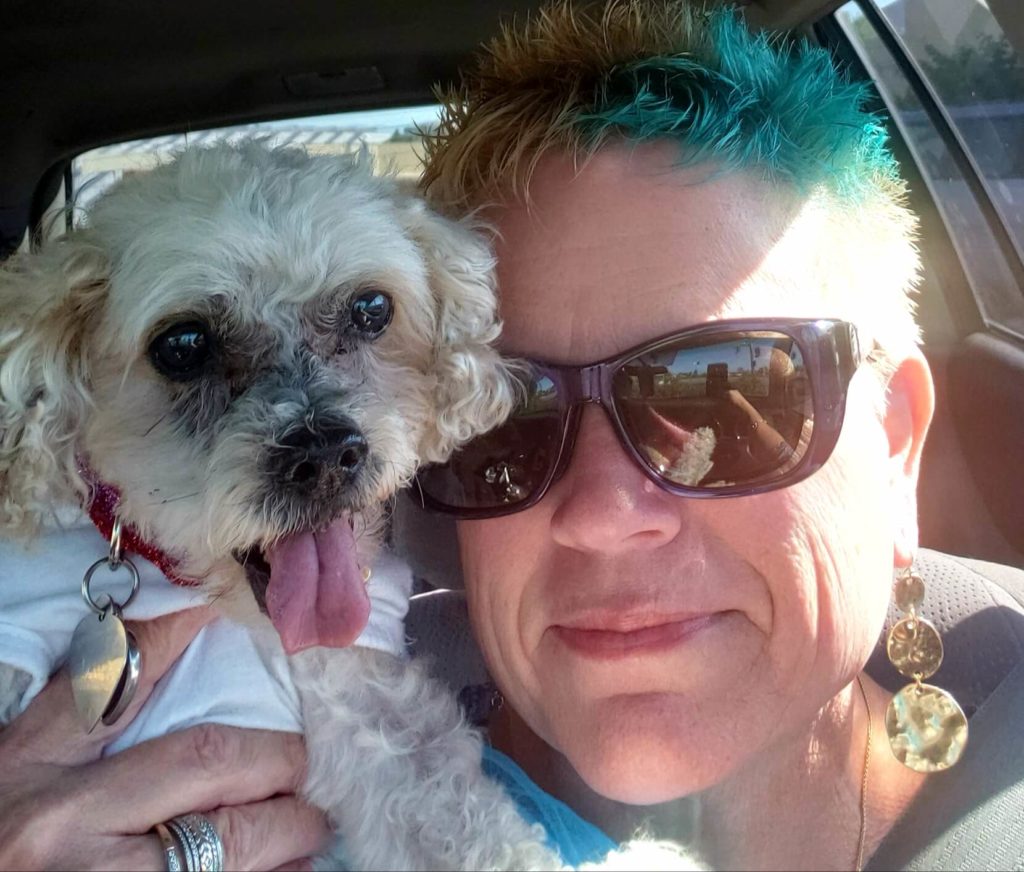
Stacie and Jill set the adoption in motion, renaming their new dog Adell and scheduling a grooming appointment. They also called their veterinarian to schedule an exam. “You two are at it again, aren’t you?” a staffer joked.
The couple’s soft spot for underdogs was no secret. They’d adopted Fuzzy when she was only one month old from a neglectful breeder’s estate. For 14 years, Fuzzy had nuzzled and cuddled Jill’s clients at her grief therapy practice. Now Adell would do the same.
When the family arrived home, Adell sniffed the place out. She settled into her new bed with the sleepy relief of a dog that instinctively knew two things: This would be her first real home — and her last.
Senior Pets Often Overlooked
While Adell has a sad past, that’s not always the case with senior pets. Many have loving homes for years until an owner passes away, a couple divorces or a new baby arrives. As a result of these events, the longtime pets need to be re-homed.
Unfortunately, senior cats and dogs are typically overlooked by potential adopters. This is true especially at shelters, says Kelly Smíšek. In 2014, she and her husband, Andy, Smíšek co-founded Frosted Faces Foundation. The organization, located near San Diego, California, finds adoptive homes for senior pets and offers programs to assist with care.
Generally, dogs and cats eight years or older are considered seniors, says Smíšek. Younger seniors usually still have their vision and hearing, and senior dogs can often still go for walks. Senior pets can be playful but are usually mellower than their younger counterparts, says Smíšek.
Depending on breed and size, dogs and cats who receive proper nutrition, exercise and veterinary care can live into their mid-teens or beyond.
Five Reasons to Consider Adopting a Senior Pet
Want to give an older dog or cat a happy home for its retirement years? Here are five reasons to consider adopting a senior pet.

1. Adoption Could Save the Animal’s Life
Not every shelter is a no-kill facility. Most public shelters regularly euthanize cats and dogs that are considered “unadoptable,” which typically means pets that don’t get adopted quickly.
“I was always taking home senior dogs lingering in kennels because no one adopted them,” says Smíšek, who worked at a shelter before founding Frosted Faces Foundation. “I always rescue from the shelter system.”
2. Older Pets Are Mellower
If you’ve ever been yanked down the sidewalk while walking a young dog or had to retrieve a kitten that clawed its way to the top of your draperies, you know that young pets are full of energy and mischief. On the other hand, senior pets are generally calmer and may already know some tricks or walk nicely on a leash.
Monika Lain-Shaw of North Fork, California, who adopted an 11-year-old German Shepherd named Nolla last year, enjoys that Nolla isn’t as high energy or destructive as younger dogs. “But she still plays like crazy with her stuffed animals,” says Monika.
3. Fewer Personality Surprises
Monika doesn’t anticipate any unknown neuroses emerging in her 15-year-old black cat, Cleopatra, adopted last year after the owner had a stroke. She knows how the senior kitty likes to be pet and doesn’t mind that Cleopatra likes to drink from the toilet.
Any adopted pet may come with habits you may want to change, and most need time to blossom, but with an older pet, the basic personality — playful, affectionate, good (or not) with kids, strangers, and other pets, for example — is usually evident upfront.
4. Older Animals Can Be Better with Other Pets
An older dog or cat probably won’t jump or pounce all over another senior pet like a kitten, pup, or adolescent, so current pets may be more accommodating. The rescue organization or shelter might even be able to tell you before adoption whether the pet gets along with other animals or has lived in a home with other pets.
5. Older Pets Can Be Good for Senior Adults
Research shows that interacting with pets lowers levels of the stress-related hormone cortisol, lowers blood pressure, decreases loneliness and boosts mood. An older, calmer pet is easier for a senior to keep up with, too. That’s why Frosted Faces Foundation offers a Seniors for Seniors program to remove common obstacles to people 65 and older looking to adopt a senior pet.
The Seniors for Seniors program includes lifelong veterinary expenses, volunteers to check in monthly, transport to veterinary and grooming appointments, and free boarding if the owner needs to be in the hospital. “With these services, one more person who couldn’t adopt before can adopt now,” says Smíšek.
Read more: Benefits of Pet Therapy
Giving Senior Pets the Home They Deserve
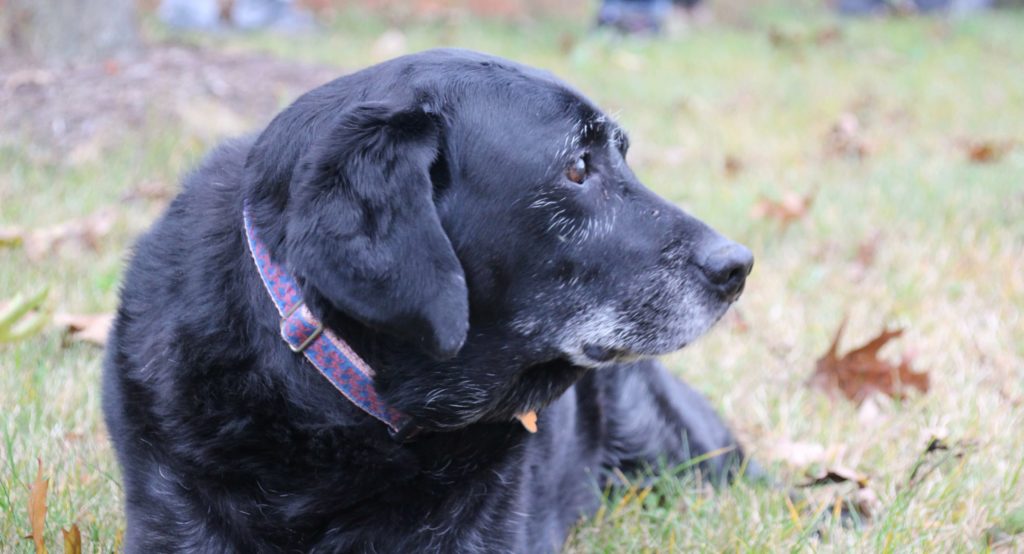
Senior pets don’t end up at the shelter because they’re bad dogs, says Smíšek: “It’s usually not their fault. They just need someone to make a renewed commitment to them.”
Today, Jill takes Adell and another adopted senior — Walter, an eight-year-old poodle — to work with her daily. “Older dogs are just as deserving of a home,” says Jill. “I enjoy giving a creature who desperately wants to be loved the care they should have had but probably didn’t receive and putting as much love in their lives as I can for their remaining years.”
Older dogs deserve not just a good home, but also good insurance to help cover any medications, procedures or appointments they may need in order to thrive in their senior years. Trusted by over 380,000 pet parents and counting, along with lifesaving shelters across the U.S. and Canada, Fetch pet insurance helps protect your furry friend, covering the most types of injuries and illnesses out of any other provider. And, if you’re an AARP member, you can receive a 10% discount on your insurance plan for life. Get a free quote from Fetch today to learn more.
If you’d like to adopt a senior pet, you can start by searching websites of animal rescues and local shelters. Better yet, visit the facilities in person, since photos of all animals may not be on the website, especially at crowded public city shelters.
Have you adopted a senior pet? Share your story with other readers in the comments.


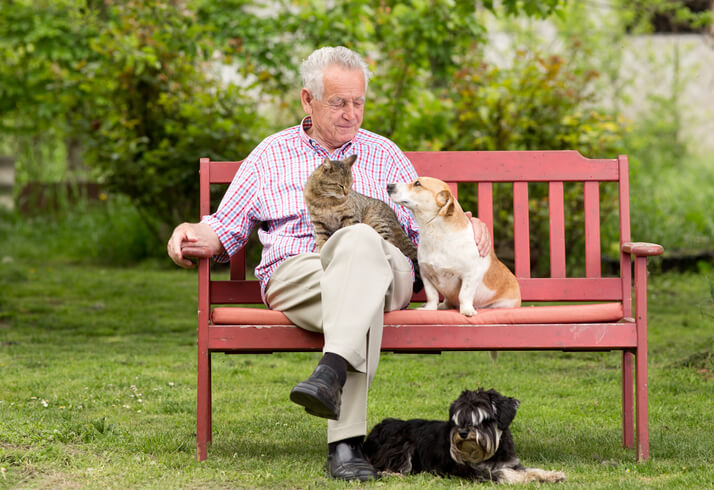


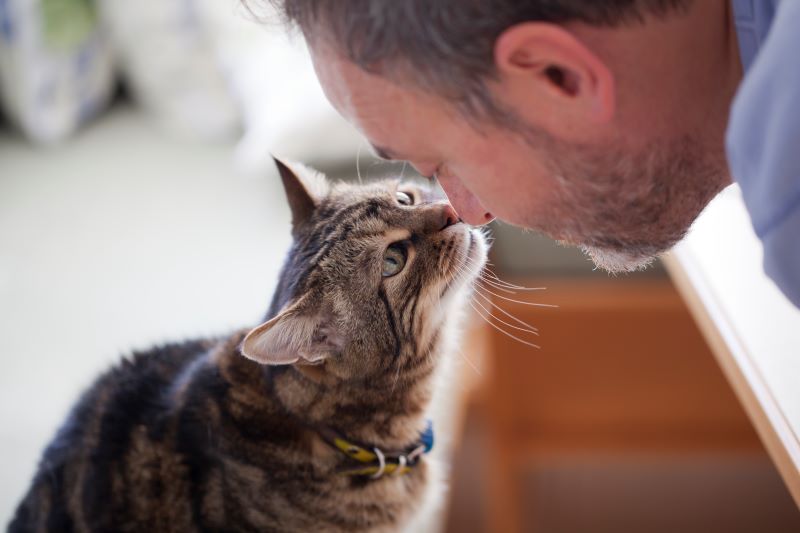
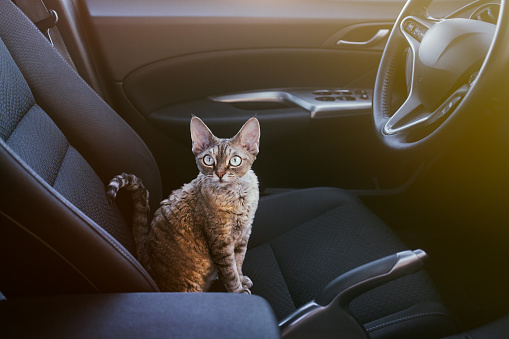

Please don’t forget Lionel’s Legacy senior dog rescue also in San Diego.
Lionel’s Legacy Senior Dog Rescue
(619) 212-5623
What a wonderful article. Thanks so much for printing it
Does Hartford have Pet health insurance?
Hi Sandi! You can find more information about pet insurance in this article here: https://extramile.thehartford.com/lifestyle/aarp-benefits/. See number 14. Thank you!
I have two rescue cats, including my beloved Silly, who just turned 18. He’s been with me since he was 8 weeks old. He’s the sweetest boy, and the perfect foil for my 2-year-old Monty. Monty is mischievous and active. They do love to snuggle together. I know Silly won’t be with me forever, because they live such short lives, and the intent is to make every second count.
My daughter and I adopted a mother and son pair of cats from a kill shelter. Mom was very sick and we know would not have survived in the shelter. They are both very active playful cats and can hear a pin drop and come running out of their hiding room just in case there’s food for them. I am 76 so if I die before them, my daughter who is 40 should outlive them.
I’m interested in a small sr dog with no health issues as I’m disabled and cannot lift anything over 7 pounds. I just had to put my Pomeranian 18 years and 3 months. I’m so heartbroken cause I live alone and he was with me all the time. I’m a great Mom and I prefer a little girl but flexible. Thanks
I do have 2 small dogs and they are something else and love me for sure.
rosie is 14 and shiekia jane is 8
I like and have had both dogs and cats,but cats are easier to care for when you get older.Cats don’t have to be walked in all kinds of weather.
Several months ago we lost our little Pepper. We both agreed that we would have no more pets. Pepper was 14 years old when he passed and it breaks your heart. I could not stand the thought of not having a pet in our home, so I contacted the local SPCA. Well we finally got our little dog. He is a mix between a chihuahua/jack russell and we adore him. He settled in right away and is very cuddly, Our little pal is 5 years old. We don’t know very much about him, but he now has his forever home.
We would love to have a small medium sized dog but with our income we just can’t afford it. We have thought about it but then we think about the Vet bills and all and we just see any way we can justify having a dog.
I also have a rescued poodle – my poodle passed after 9 years – I said no more pets -I week later I started to look for a breeder in area – the waiting period was over year- the last breeder I talked to said she a miniature apricot that 7 years old – the lady that owned her had issues and was retired to 2 times before and then committed suicide the family returned her. No one wanted her. We went to the see her – we fell in love with her – she did not look like poodle (the breeder was in there 80’s) she looked mess – but run to us tail waggle licking our faces she had so much love give – we took her our groomer and Vet – she gorgeous well trained has trained us she let know when she to go outside and has trained us
We have 3 yellow Labs.
Nani Kai was a rescue from a shelter in Boise, Idaho, we adopted her at 15mos. She just turned 8 yrs old.
Dude is a rescue from Kamiah, Montana, we adopted him at 2 yrs old. He is 6 yrs old. Previous owner placed him a Goat pen and threatened to “Put a Bullet in him” if he ran way again!.
Mia is our youngest and not a rescue. She will be 6 in July.
Our Labs are all from another Mother, but siblings together in our family.
Dogs do make our lives whole. Love my Labs (fur babies).
I am very appreciative to those of you who adopt middle or elderly animals. I searched for months looking for an elderly Vizsla. I went nationwide in my search and found none, while looking for a Vizsla to fill the emptiness left by Charlie’s death. Those pet owners who have never experienced the love of a Vizsla are missing the affection,magic and warmth that this breed customarily provides. They feel like warm velour. I am expecting delivery of the Stork-Canine Service on June 19, 2020 who should be bringing me one of the many Vizsla loves of my life. At age 75, these pets fill me with laughter and happiness. They sure beat some of the solitude that old age usually brings. God bless all.
A year ago, I had to have my beloved 14 year-old chihooahooa “put down” as his quality of life was no longer good — it was his heart and the vet said there wasn’t anymore we could do. Smokey kept falling over and was listless and we knew he just wanted to go on to heaven. We were without a dog for almost a year and our house seemed so empty. I started looking on line to shelters and foster-care sites and saw a small dog that seemed perfect and filled out an application. The foster-care “mom” wrote back and said she didn’t think that dog would work out for us since we are both in our 70s (77 and 79) but she had another dog that she had just gotten from a shelter which was going to “put down”. She said the dog was about 10 years old, a small min-pin-dachshund-chihooahoo combo. He only had one eye and she didn’t know why it had been removed. Well, I called her and said we’d like to adopt the dog whose name was Albert. A coincidence, incidentally, since my deceased father’s name was Albert. We drove the 90 miles to meet Albert and that was Christmas Eve, 2018 and he is the best dog either of us has ever had. My husband used to own Scottish deerhounds and show them all over and he said there is something very special about Albert. Our house no longer is quiet and empty – it is now full of giggles and laughter as we play with Albert. We love him SOOOOO much….but he is winking at me with his one eye and says he loves us way more!!!!
All 4 of my dogs are seniors now. I took in a 12 yr. old GWP when her dad passed & family did not have time for her love breed couldn’t say no. My precious Duke had a grade 3 heart mumur needs special diet 3 fatty tumors bother sometimes coming up stairs outside pick him up sleeps in ortho bed next me prefers it to stairs into my bed. Seniors are the BEST always take them if looking. Deserve best All my dogs are adopted when they cross Bridge cremated & come home. Love them all so much makes me so angry when their families dump them when mine go I am getting too old but hope to always have 1. They give so much ask for so little.
A perfect solution for dog lovers who can’t carry out the daily routines anymore is the Maine Coon cat (they are like a dog in cat’s clothing). I’ve had them for nearly 30 years, they’re wonderful. I used to be a dog person, now I wouldn’t have anything but a Maine Coon. They are believed to be the oldest domestic breed in North American (most likely descended from the Norwegian Forest Cat – brought here by the Vikings). Try them, you’ll not be disappointed.
I have been doing small dog rescue for almost 18 years but, when I got a call from a hospice group asking me to consider taking a 3 lb., 17 yr. old Yorkie with multiple issues, of course I said yes. Gizzy was blind, deaf, had an enlarged heart and had his vocal chords disabled. It became clear he had been a breeder. He also had all his infected teeth removed and his tiny lower jaw had 5 fractures requiring his jaw to be wired. He was not a sweet little guy. However, he deserved to be loved. Last summer, 3 months short of his 21st birthday, he calmly walked out on the deck, curled up on a sun soaked pile of leaves and gently crossed the 🌈. What an experience!! Within hours of arriving, he knew where his food and water dishes were and, when his food dish was ready, he could beat me from his bed to the kitchen. A great of a lifetime. Test well, darling Gizmo. 😍
my sister saved a senior cat who was being put down, as a therapy cat for our mother who was battling cancer. he was amazing – it’s like he knew his job was to comfort mom when she was in pain. cuddled and slept with her, put up with her “petting” (mom had long nails, must have been painful), kept her company until the day she died. sister couldn’t just give him away, and made him part of her kitty family. he has now found the love of his life. he and my sister’s youngest, a slightly wild and crazy girl, sleep together, groom each other, and are inseparable. hoping the romance lasts a long time 😀
I am a senior, and there is nothing better than to have , take care of, and play with my three Shih Tzu’s and my Maltese mix. All rescues. THE BEST THEARPY, and great watch dogs. Nothing comes near my home without me knowing in advance.
We adopted a 6 yr 11 month old Yorkshire Terrier in 2017. She is now 10 years old and we adore her. Don’t be fooled by the saying “you can’t teach an old dog new tricks”—because you CAN. I managed to trace back her previous owner, who said that she knew no tricks and was flabbergasted when I told him that I taught her to use the doggy door, sit and lie down and stay with either command, roll over, beg, shake hands, and crawl on her tummy. She is so smart and loving, we could not ask for a better doggy. She appears to have been used only for breeding before, but now she is “used” as a lap warmer, a bed partner, and to make us laugh at her antics with her toys. She give us so much love and will be our precious little girl for the rest of her life.
I adopted a cat that was 8 years old. She apparently was dropped off to a shelter with a dog because the family wanted a kitten & a puppy!! The shelter never told me about the dog. I found out a year later. I would have adopted them together. Peanut is a loving sweetheart and I can’t imagine my life without her. I would certainly adopt an older pet again!!
I adopted a senior just over a year ago he was 10 years old. He is a large dog, that would like to be a lap dog. He has fit in my home so well, I went to a site that listed seniors for seniors site. He is just a sweet heart and very loving dog.
We adopted LuLu 5 years ago from Fetching Tails. She was found wandering the streets. No collar, no chip, and map nourished. We started as a foster parent and Lulu was the first dog placed with us. Sadly we were failures. As soon as LuLu got one paw in the door she had a permanent home. Some day when LuLu passed on it will be back to the shelter and starting with the dog who has been there the longest. It’s the right thing to do.
A few years ago I adopted a senior Cocker Spaniel by the name of Molly. She had a few health problems; but, I adopted her anyhow. She was already 7 1/2 years old. She turned out to be such a gentile and sweet dog. She was very out going and confident. Unfortunately her health issues finally caught up to her and she passed on. I miss her to this day. I have a tear in my eye just typing this. Just remember, you’ll need a strong heart if you adopt a senior dog; because, you won’t have them around very long.
Just got a puppy 9 weeks old.
I WANT A LAB DAVE
I adopted a 7-yr old Chihuahua who was literally on her way to be euthanized. She weighed twice what she should and couldn’t walk. With a proper diet, lots of exercise and a great Vet. she was in prime shape within a year. Yesterday we celebrated her 18th birthday. She is my constant companion and I couldn’t love her more. I had just become disabled and a 20-yr relationship ended so she saved my life just as much as I saved her’s. Best decision ever!
I am looking to adopt an older animal as a companion to myself and my 7yr old adopted cat Smoke. He needs a companion and would like a senior pet friend as well.
We adopted Navi after his owner passed. While her daughter had taken care of him, she didn’t want to keep him. So we took him. A small 5# chihuahua. He is so funny, cute, loving, demanding. He is a heart patient. Shouldn’t even still be here at 14. But we keep praying he will live forever. Wish we could clone. Him.
We had a blue heeler named Bear. He was our son; he literally thought he was human. If I thought it, I would turn and he would be there, looking at me intently. He was sick with bladder issues. My mother in law went to a July 4th adoption party and came home with a shiba inu we call Koda (means little bear). She nuzzled with Bear until he passed away in October. She is about 11 now, and Now nuzzles with her dad. She adores him. Koda saved us before we knew we needed to be. She is white faced now, but still rascally. Sleeps a lot like us. We couldn’t love her more. Just go get yourself a Koda. You’ll know then you needed one! And, he/she will need you.
Four years ago I adopted a 13-15 year old Siamese. Her family had passed and she had been taken in by family members who had other animals. That didn’t work so she was turned in to the shelter. She has been the most loving and grateful cat I’ve ever had. I also adopted my other two cats at shelters. My cats have made sheltering in place much more pleasant.
Senior pets are the best. I got my baby Rocky 4 years ago at the age of 6. Hrs now 10 and the best dog I’ve ever had! He’s a small chihuahua with the biggest heart.
I do board pets for other families …. $ 10 day ….. must be housebroken …… not destructive …
get along with other people and pet. I do not have a problem finding families.
Owner a pet on only my social security income would be difficult. Veterinary cost are total overwhelming. Unlike my days of practicing in rural Minnesota.
I hate pets
Mixed breeds seem to have better personalities. The better characteristics seem to dominate. Of course, they have fewer health issues on average.
I adopted my Coco, saw him pictured on the shelter where I live. Coco was a beige poodle, had a poodle previously, so when I saw him, I knew I had to have him. He was a senior, 10 years old. I’m a senior. She passed away when he was 14 of Pancreatitis. I only had him for 4 yrs. Not long enough, his Vet told me “you gave him the best years of his life.” He could’ve spent the rest of his life in a shelter, or worse. Please consider a senior shelter pet, you won’t regret it.
Wonderful idea! Insightful information. Will consider for my next pet adoption.
I’d love a dog as I live alone. However I live in an upstairs apartment and am not able to walk the dog many times. What do you recommend “
I adopted a Chesapeake retriever at age four and he has been the best companion during this time of a lock down. I don’t know what I would have done without him and his support and love for me and now he is ten years old.
I have adopted older animals for many years. I now have two dogs, a Coon Hound and a Chow Chow. One cat ran away because the Chow does not like cats and we didn’t know that when we adopted her. In any case, I can recommend adopting older animals because they are generally well behaved and most have been trained.
I was proud to have two Goldens back to back for a combined 24 years. I loved them dogs. Lucky and Heidi.
We just adopted a 9 1/2 year old Cairn terrier on May 21. Josie had a loving owner who passed away and his wife didn’t want Josie. She was surrendered to Top Dog Foundation in Minnesota, who only recuses senior dogs. She was bewildered and worried as any dog would be after losing their home. Her foster parents had started her on the road to healing when we adopted her. Now Josie loves going for long walks, fetching balls and being with us wherever we go. Though we will have a shorter amount of time to love her, I am so happy we can make her senior years happy as she is making ours so happy.
We adopted a senior Golden Retriever. He was a loving boy until his death. It was so fulfilling to give him the love and care he deserved. We also adopted a senior cat. Simon was the best cat ever. He loved sitting on my lap for hours. It was no burden to provide the extra care he needed. Senior pets are so appreciative of the love and care in their golden years.
We have two rescues, Charlie, a wild little mix guy, very sassy. No “dog” talk in his presence, he’s a person! And Mertie, a challenged kitty) cross eyed, and just a little off center)❤ we wouldn’t know what to do with out them.
looking for a dog about 5yrs old.
very little shedding to no shedding
Would like a Border Terrier
We lost a registered Pomeranian on Christmas Day 2004. We lasted til May with wife making weekly trips to the local pound looking for the one that “clicked”. She found Maggie. An 8month old mixed golden retriever and chow (black mouth). She has been the best we’ve ever had. Almost 16 years old and still pretty active although about 80% deaf and on meds for arthritic and thyroid. She has been a blessing in so many ways and has let our great grandson watch TV while using her for a pillow for the past 8 years. Dread the day we lose her. Truly a member of the family. Wish I could post a picture.
Two years ago I adopted a fourteen year old female dog, named her Suzie Faith. She was in horrible condition when Forever Home adoptions took a chance on her. She has only one eye and no teeth. We love each other very much 💓
I adopted my two cats three years ago just before their 11th birthdays (Oct & Nov). They were turned into the Humane Society of Tampa Bay left in a cage together for 5-1/2 month because no one wanted to take an older cat home. I left with both of them; now they are the most important loves of my life. PLEASE DON’T leave the older ones behind.
I couldn’t love the more.
I already have three cats all were adopted strays. My brother has six which were adopted strays also. They are all wonderful cats and get along very well with each other. Two were brother and sister and two of the others came from the same mother in successive years. I can’t possibly imagine not having them!
Hola dígame si tienes una respuesta porque quiero sacarle un seguro a mi mascota,ella tienes un año y medio.es una maltes muy saludable pues la tengo bien cuidada.pero soy una persona mayor y tengo miedo que se me enferme y los cotos de mascotas son muy caros.ATT ana alonzo.gracias
Hi Ana! You can find more information about pet insurance in this article here: https://extramile.thehartford.com/lifestyle/aarp-benefits/. See number 14. Thank you!
Another cat. Actually ANOTHER Canadien Cougar. I miss mine.
I have a small dog that is old ,too
I am a feline fancier and will always have a cat.
I adopted my pug Julie 8 years ago when she was a 7 1/2 year old who had weaned her last litter of puppies. The breeder released her to a pug rescue group that spayed her, gave her needed veterinary work and socialized her in a foster home. She has been the joy of my life ever since, and now as she nears 16, she has slowed down physically, but has become an even more loving companion to this senior widow who also has slowed physically!
The article was Great!!!!! The problem finding a place or places of you have several or more give or take!!!! So that is the important question or issue. Help?????? Thank you!!!!!
Help your loved one stay social by looking for ways they can get out and enjoy the fresh air with friends such as in a gardening club or exercise group or getting involved in the community.
It can be enormously helpful for you to check in several times a week, either by phone or by a video messaging service like Skype.
Do some research on local facilities that offer these services and make sure your loved one will have access to their information.
What is senior care authority?
How to pay for senior care with limited resources?